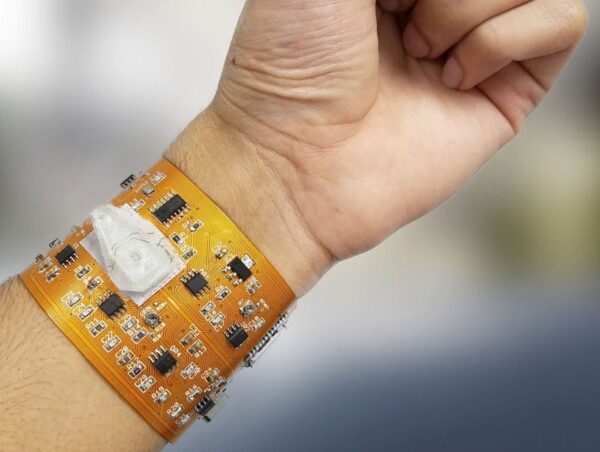Hunniwell Lake Ventures || Spotlight Series
The Next Generation of Diagnostic Wearables
August 5, 2020 || Rizlab Health is transforming the diagnostic device ecosystem with their rapid and portable hematology analyzer, Cytotracker. With applications for COVID solutions, the device has the potential to stratify high-risk COVID-19 positive patients and provide diagnostics at the point-of-use, creating an opportunity for highly accurate diagnostics beyond healthcare settings.

Read more on Hunniwell Lake Ventures COVID-19 Resources
Mehdi Javanmard is the founder and CEO of Rizlab Health. In 2002, Javanmard received a B.S. from Georgia Institute of Technology, and he later received his M.S. in electrical engineering from Stanford University. During his time at Stanford, he worked on the development of electronic microfluidic platforms for low-cost genomic and proteomic biomarker detection and later worked as a Senior Research Engineer at the Stanford Genome Technology Center. In Fall 2014, he joined the Electrical and Computer Engineering Department, Rutgers University as an Assistant Professor. His research interests include developing portable and wearable technologies for continuous health monitoring and understanding the effects of the environment on health. In 2017, he was the recipient of the Translational Medicine and Therapeutics Award by the American Society for Clinical Pharmacology & Therapeutics for his group’s work in point of care diagnostic tools for assessing patient response to cancer therapies. He has received various awards as a Principal Investigator from the National Science Foundation, DARPA, and the PhRMA Foundation to support his research (Based on Zhao et. al 2018). He was recently awarded the National Science Foundation CAREER Award for young faculty in 2019 and the DARPA Young Faculty Award in 2020. He founded Rizlab Health in late 2018, a spin-off from his lab at Rutgers University.
- Tell us about yourself and your background.
- Can you tell us more about starting Rizlab Health and the process of creating a startup company?
- Has your company pivoted because of COVID-19? If so, what does that pivot look like?
- Did you have to change your technology to pivot to COVID-19?
- Do you have any personal anecdotes about the changing VC space since the onset of COVID-19?
- Have you experienced any significant supply chain disruptions during the pandemic?
- Have you noticed any interesting trends in your industry in the past five years, and how do you think COVID-19 might affect your device space?
- Can you discuss your Cytotracker device and collaboration with NASA? What do you envision for future applications of Cytotracker?
- What’s next for your company?
Tell us about yourself and your background.
Through my education, I was interested in the interface of electrical engineering, mechanical engineering, and medicine. My research was focused on building innovative devices that could diagnose various types of diseases. At Rutgers, my lab develops portable, wearable medical diagnostic devices – in-vitro diagnostic devices – for analyzing biomarkers and various types of biological samples, such as blood, saliva, and breath. One of the technologies we developed enabled miniaturized hematology analysis. This research led me to launch my startup, Rizlab Health, where our focus is taking hematology analysis from the lab bench to the patients’ fingertips by building a portable and affordable hematology analyzer.
Can you tell us more about starting Rizlab Health and the process of creating a startup company?
During my time at Rutgers, my lab worked to develop a miniaturized impedance cytometer, a really small chip with a measurement apparatus that can count cells electronically at a very sensitive level. With our electrical system, we could miniaturize our instrument and make it wearable. During this process, we collaborated with Rutgers Medical School and various life sciences departments where we learned about the problems that providers face in the clinical setting and the opportunities for innovation. Specifically, we observed that a point-of-care hematology analyzer that is portable and affordable does not yet exist. One of the most routinely performed lab tests in the clinic, hematology analysis performs complete blood counts to measure white blood cells, red blood cells, hematocrit, hemoglobin, and platelet levels.
A rapid hematology analysis can be crucial to assess the gravity of a patient’s condition and administer effective treatment. Currently, methods take up to two hours before getting the results back, making it harder to treat the patient. Rizlab’s technology provides rapid results, allows quick treatment, and saves the hospital resources. Therefore, there is a real opportunity by making this device portable to where you can do the measurement at the point of need, requiring only a drop of blood, and making the instrument affordable so that you can have these all over the hospital instead of just one unit in the lab.

By counting the number of red and white blood cells in a user’s bloodstream, Rizlab Health’s portable and wearable wristband analyzes for indicators of common diseases and transport data and information to medical professionals. (Image from Rutgers.edu).
Has your company pivoted because of COVID-19? If so, what does that pivot look like?
Before the COVID-19 pandemic, we were working with BARDa to quantify neutrophils, lymphocytes, and white blood cells with the purpose of discriminating between viral and bacterial infections, which is a challenge in medicine that has existed for decades. Because COVID-19 patients experience varying degrees of disease severity, knowing your white blood cell differentials can be an important measure of this attribute. When COVID-19 hit, we realized our technology could help stratify COVID-19 patients that are at higher risk and require more serious treatment through white blood cell differentials. This application is an active pivot towards COVID-19 solutions from Rizlab.
When COVID-19 hit, we realized our technology could help stratify COVID-19 patients that
are at higher risk and require more serious treatment through white blood cell differentials.
— Mehdi Javanmard, CEO & Founder of Rizlab
Did you have to change your technology to pivot to COVID-19?
No, that’s the nice part. We were working on this technology with BARDa before COVID-19 hit and will ultimately start a clinical study in the Fall using our device. Thus far, we have not experienced delay; however, we will likely change the original design (measurements for flu patients) because our cohort of subjects will likely include COVID-19 patients. This presents an interesting opportunity to do measurements on these patients.
Do you have any personal anecdotes about the changing VC space since the onset of COVID-19?
I have not. It is an interesting time, and I think some VCs are looking to invest more in the COVID-related space. However, there are also investors who want products that will have a lifetime beyond COVID. There is this expectation that the pandemic isn’t going to last forever, and hopefully in a year or two when life gets back to normal, this product will be broadly applicable and useful as well.
Have you experienced any significant supply chain disruptions during the pandemic?
Yes, the ability to manufacture devices for testing has become very difficult. In fact, it did come to a halt for several months, but various foundries and fabrication facilities are slowly starting to reopen again, so we’re hoping that we can revamp our efforts in that sense.
Have you noticed any interesting trends in your industry in the past five years, and how do you think COVID-19 might affect your device space?
The diagnostics ecosystem has been significantly geared towards large centralized lab models, and in terms of cost-effectiveness it is difficult to compete with that model. Centralized labs have the capability to perform hundreds of tests simultaneously, and insurance reimbursement is geared towards the centralized lab model. Moreover, I feel the odds are often stacked against the point of care diagnostic community and ecosystem. However, the fear of going to hospitals and clinics due to COVID-19 has revealed that the centralized lab model is not adequate anymore, and now there is an increased need for drive-through testing, remote monitoring, and saliva testing.
However, the fear of going to hospitals and clinics due to COVID-19 has revealed that the centralized
lab model is not adequate anymore, and now there is an increased need for drive-through testing,
remote monitoring, and saliva testing.
— Mehdi Javanmard, CEO & Founder of Rizlab
Moreover, as the economy reopens, different employers will require COVID-19 testing to return to work. I think the importance of this testing is becoming more apparent now, and I hope that this will result in a paradigm shift with insurance companies and stakeholders better understanding the importance of remote monitoring and point of care diagnostic devices.
Can you discuss your Cytotracker device and collaboration with NASA? What are other future applications of Cytotracker?
We have recently partnered with NASA to explore the application of our Cytotracker to monitor astronaut’s health during long-term space missions and hope this collaboration will expand to future projects with NASA. About a year ago, we won an industry innovation grant through NASA’s Translational Research Institute for Space Health, based at Baylor College of Medicine to conduct this research. During these missions, astronauts experience a range of health conditions such as anemia, thrombocytopenia, and sleep apnea, so having easy-to-use, portable, and low-power hematology analyzers can be very useful to monitor these biological changes.
Our ultimate vision with the Cytotracker is to make a device that is portable, affordable, and can be delivered to settings where you could not otherwise perform a point-of-care measurement.
— Mehdi Javanmard, CEO & Founder of Rizlab
Our ultimate vision with the Cytotracker is to make a device that is portable, affordable, and can be delivered to settings where you could not otherwise perform a point-of-care measurement. We can see applications of our device in elementary school infirmaries, disaster zones, and accident sites, allowing responders to perform rapid diagnostics that well inform their next decision. These new, high-impact use cases can be enabled by our Cytotracker.
What’s the next step for your company?
Currently we are working extensively on prototype and product development. Our goal moving forward is to begin regulatory approval processes starting in the Fall. We aim to begin a clinical study and to get FDA approval, so we are hoping that in approximately a year we can apply for a 510(k) application with the FDA.
![]()
Hunniwell Lake Ventures is featuring a series of healthcare startups in the fight against COVID-19 to honor their work and persistence during this pandemic. As a venture investor specializing in medical devices, Hunniwell Lake Ventures is well-positioned to help our colleagues address the COVID-19 scientific complex, patient care, and public health crisis.
